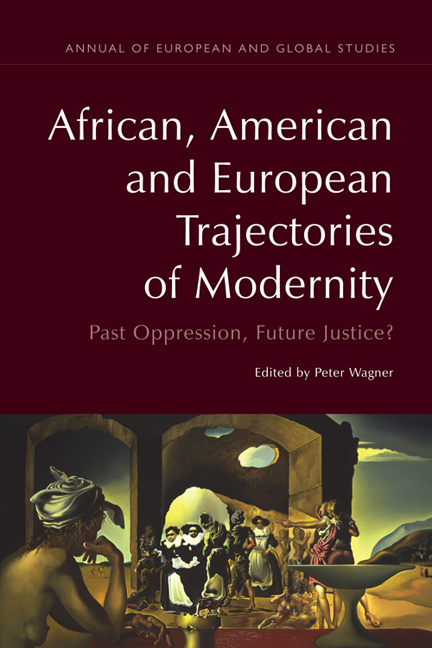Book contents
- Frontmatter
- Contents
- List of Figures
- Introduction
- Part I Reconstructing the History of Atlantic Modernity
- Part II Comparing Trajectories of Modernity in the South
- Part III Claims for Justice in the History of Modernity and in its Present
- 9 An Unsettled Past as a Political Resource
- 10 Injustice at Both Ends: Pre- and Post-apartheid Literary Approaches to Injustice, Sentiment and Humanism in the Work of C. Louis Leipoldt, Pumla Gobodo-Madikizela and the Film Invictus
- 11 The Student Movement in Chile 2011–12: Rearming the Critique of Capitalism
- 12 Indignation and Claims for Economic Sovereignty in Europe and the Americas: Renewing the Project of Control over Production
- Notes on the Contributors
- Index
12 - Indignation and Claims for Economic Sovereignty in Europe and the Americas: Renewing the Project of Control over Production
from Part III - Claims for Justice in the History of Modernity and in its Present
Published online by Cambridge University Press: 05 August 2016
- Frontmatter
- Contents
- List of Figures
- Introduction
- Part I Reconstructing the History of Atlantic Modernity
- Part II Comparing Trajectories of Modernity in the South
- Part III Claims for Justice in the History of Modernity and in its Present
- 9 An Unsettled Past as a Political Resource
- 10 Injustice at Both Ends: Pre- and Post-apartheid Literary Approaches to Injustice, Sentiment and Humanism in the Work of C. Louis Leipoldt, Pumla Gobodo-Madikizela and the Film Invictus
- 11 The Student Movement in Chile 2011–12: Rearming the Critique of Capitalism
- 12 Indignation and Claims for Economic Sovereignty in Europe and the Americas: Renewing the Project of Control over Production
- Notes on the Contributors
- Index
Summary
Introduction
WHAT DOES AN actor (or set of actors) do when, after protracted negotiation, she/he agrees to an imperfect compromise that nevertheless guarantees some important benefits, and after a certain period of time the opposing party decides to revise the deal by imposing terms that are clearly worse than those of the compromise they had settled upon? Does the former actor (or set of actors) fight to defend and recover the terms of the original compromise? Does she/he, instead, feel she/he may legitimately reset the terms of the negotiations to pursue what she/he had originally renounced?
In this chapter we shall present contemporary social movements such as the indignados, the ‘occupy’ movement and popular protests in some Latin American countries as (sets of) actors that, albeit in different ways, appear to be pointing towards the second option. In effect, given the evidence that all the ‘social deals’ of the second half of the twentieth century– or the expectations they gave rise to– have been and are being undermined by the neo-liberal turn of capitalism, these movements are taking shape as forms of action that aim not only at defending some achievements of ‘reformed capitalism’ but also at exploring the possibility of forms of social and economic organisation that go beyond purely capitalist logics, as they try to recover one of the central goals of contemporary emancipatory traditions, namely control over production and distribution.
To do so, in the first part we shall analyse what the post-World War II ‘social deal’ meant and what actors, historical trajectories and societal self-understandings contributed to its appearance. Then we shall show some of the various institutional concretisations of the deal, and we shall explain why, both in Europe and North America and in Latin America, the guarantee of (very dissimilar) degrees of socio-economic security went hand in hand with a decrease of collective economic sovereignty. In the third part we assess the effects of the neo-liberal turn in terms of a decrease of the working populations’ socio-economic security, and suggest that this dismantling of the former ‘social deal’ helps disseminate the seeds of current forms of rebellion– with the city being the main focal point of our analysis.
- Type
- Chapter
- Information
- African, American and European Trajectories of ModernityPast Oppression, Future Justice?, pp. 258 - 287Publisher: Edinburgh University PressPrint publication year: 2015



